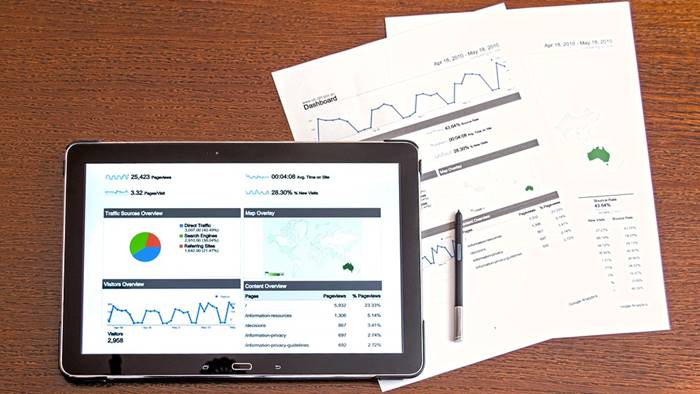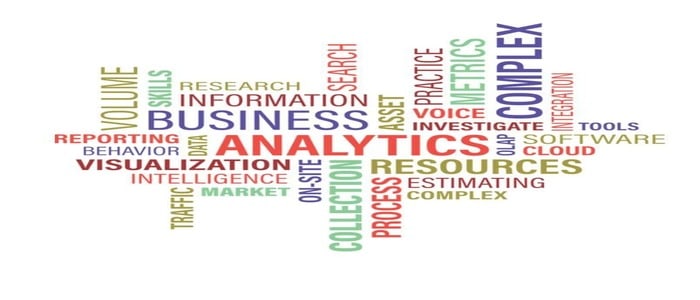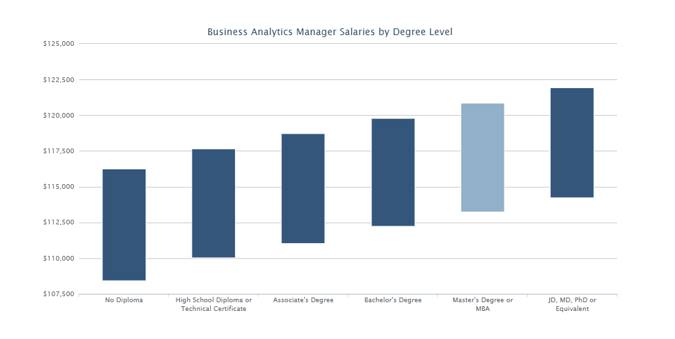Masters In Business Analytics

Masters in Business Analytics is a perfect blend of Data Science, Information Theory, Business Intelligence and Computer Science. Its major aim is to change heavy data into actionable intelligence by using different quantitative and statistical methods. To put it simply, Masters in Business Analytics is concerned with mining data in order to get particular business objectives; instead of focusing on measuring past performance, it’s more concerned with predictive and prescriptive techniques.
Master in Business Analytics is the solution for the increasing demand for complex data analysis to solve business-related problems. The program focuses on how to use relevant data to solve complex business problems and maintain that particular data. In this particular program, the students will be trained in Business Intelligence and familiarized with Data Analysis tools so that they can perform predictive modeling. It’s all about analyzing past performance of the company and making a strategy how it will perform in future and take business decision accordingly. For instance – Take a chain of shopping malls. They can use Business Analytics to use data to understand where to open their next branch for higher profits.
Why should you go for Masters in Business Analytics?

High in Demand: While Masters in Business Analytics is comparatively new, it’s quite popular among the world’s major MNCs. The companies which don’t have their own in-house Business Analyst will outsource and take services of Business Analytics companies. It is due to increasing interest in Business Analytics in the IT sector that various Business Schools have started to offer Masters in Business Analytics.
Short Duration: Master in Business analytics is 12 to 14 month (Full Time) long program. It is considered one of the shortest Masters Program for an in-demand job.
Higher Salary: Pay scale for candidates who have Masters in Business Analytics is quite high. To give you an idea – the average salary is $80,000. In the US, the employment rate for Masters in Business Analytics graduates is 69.4%.
Various Job Profiles: Even if the candidate holds a degree in Masters in Business Analytics, it doesn’t mean that they have to be a Business Analyst. There are various job profiles such as Financial Analyst, Market Research analysts, Statistician etc. So, don’t shy away from exploring!
Higher Growth: According to the US Bureau of Labour Statistics, Business Analysts jobs are predicted to increase by 20% by 2020. So, the job opportunities for Business Analysts are already growing and will continue to grow over the years.
Which Skills are required for Masters in Business Analytics?

Candidates with Masters in Data Analytics degree play critical role in company growth and productivity. What are some core skills required for Business Analytics?
Analytical Skills: As a Business Analyst, you need to be good with analytical tools, so you can efficiently design and implement the process of forecasting and gap analysis.
Computer Skills: We live in the 21st century which is considered the tech era, and as a business analyst you should be able to work on different data-oriented software, and you should have knowledge of Microsoft Office Suite, SharePoint, Visio, and Software Design Tools. You should be up to date with the latest developments in tech and IT sectors.
Problem-Solving Skills: As Business Analysts, you have to understand the problems of the organization and come up with strategies that would solve those particular problems.
Critical Thinking Skills: During your projects, you must assess several choices before leading your team towards a solution. You need to critically review data, documentation, workflow, and user input surveys. There might be probing questions until each issue is assessed in its entirety to know the best conflict resolution.
Interpersonal and Communication Skills: Interpersonal and Communication skills to help you and your team to work together and provide quality service. Such skills include giving presentations, facilitating meetings, resolving conflict and the ability to both negotiate, and influence others.
What are the Admission Criteria for Masters in Business Analytics?

The admission eligibility for this particular program varies according to the necessities of different universities. The compulsory eligibility criteria by the top universities is mentioned below:
Candidates are required to have an educational qualification of 16 years and should have completed their undergraduate program.
Candidates with 3-year undergraduate degrees will be considered for admission based on a holistic review.
An undergraduate GPA of 3.0 for either all 4 years or for the last 2 years
GMAT or GRE scores: The score criteria for these tests differ for each university. Target a good score as it increases your chances to get admission in a top university.
English Proficiency documents: TOEFL and IELTS score differ according to universities. Again, a good score will boost your profile.
Knowledge of calculus is asked for in various universities. A candidate who has not finished their undergraduate calculus course may fulfill the prerequisite by completing Quantitative Foundations in Business.
Some colleges, students pursuing the Master of Science in Business Analytics degree program are required to accomplish 1 semester credit hour of Professional Development course or some other equivalent.
What are the Career Opportunity after completing
Master in Business Analytics?

Companies are more focused towards understanding their critical business issues before getting into something new. In today’s challenging economy -irrelevant of their size – organizations make decisions based on their past performance. Before planning any new strategy, they study new trends and the analytical data available in their domain that will give them insights for positive results.
In order to achieve this, there is a requirement of people who are equipped with business analytics & problem-solving skill set. These are some of the job profiles that revolve around this domain –
Business Analyst (Consultant /Manager): As a Business Analyst Manager, you should have a good grasp over technical tools, data gathering, and processing, data analytics foundation methods, having good insights and understanding of team management. Other vital skill-sets that you need to become a Business Analyst Manager is communication, leadership and strategic thinking.
Quantitative Modeler/ Analyst: As a Quantitative Analyst/ Modeler, you have to work with comprehending data models and create a strategy to support business decisions. For this particular job role, you must have a strong background in Computer Science, Mathematics, Science and Engineering. Working with Mathematical models is more valuable as it gives concrete results and lowers the risks associated with human reasoning.
Business Analyst (Data): In this particular job profile your work is more emphasis on data, you must have knowledge about the technical modules related to manipulating and managing data.
Data scientists create a visual representation of data and generate actionable information from data and a Business Analyst makes use of this information to generate insights about the business and create strategies to solve business-related problems.
Data Scientist focused On Technology: If you are less interested in numbers and statistics then you should go for the technical aspect of business analytics. Here you will work with databases, coding, high-performance computing and parallel processing, and machine learning.
Data Scientist focused On Analysis: If you are more interested in the analytical side of the domain then your work would be creating complex data models and simulations in a big data environment.
The core job role you will find in each job profile is:
● Work with colleagues to know the requirements of departments and the organization.
● Work on data modeling practices to analyze your findings and create a strategy for strategic and operational improvements.
● Focus on opportunities and possible risks attached to the recommendations you make.
● Recognize the processes and Information Technology required to introduce in your recommendations
● Create a written documentation which will support your work, report on your results and present it to stakeholders when necessary.
What will be the salary after completing Masters in Business Analytics?

According to the US Bureau of Labor Statistics, in the next 10 years, about 96,500 new Management Analyst jobs will be created i.e. on an average of 12% of growth in the industry. The average starting salary is about US $81,330.
Salaries for Business Analytics Graduates by function:
Every industry is looking for people who are equipped with Business Analytics skill-sets. The Salary will differ on the basis of what career path they choose.

Source: Prodigy Finance
Salaries for Business Analytics Manager by Degree Level
Companies all around the world are having a hard time to recruit analytics professionals with the right skill-set. The salaries are even better for the people who hold the Master’s degree (MS or MSc) in Business Analytics.

Business analyst job profile exist on a permanent basis in organizations, but you can also work as a freelance or contract basis after getting some relevant experience. As an experienced Business Analyst, you can expect to charge around £350 per day.
MBA vs Master in Business Analytics

Duration: Full-time MBA Degree requires a maximum of 2 years because it covers overall business management, it doesn’t stick to one specific business domain. Business Analytics is a more specialized degree program that deals with how to collect, manage and analyze business-related data and create a strategy for applying these findings to a decision making process. The duration for this program is maximum 18 months.
Program Structure: Business Analytics programs may require students to complete a Capstone Project or internship prior to graduation. This helps the students to apply their knowledge to a real-world problem. In this particular program, you have to take some elective courses to finish your degree, but common core courses often include topics in data analytics, programming, data management, models and statistics.
In MBA, students are required to complete an internship for related work experience but it is not limited to analytics, marketing, entrepreneurship, human resources, real estate, information systems, accounting, and finance. The students in these programs must take some elective courses in their area of specialization, but some common course topics for these programs include organizational behavior, managerial economics, financial accounting, project management, and marketing. organizational behavior, project management, and marketing.
Job Profile: Graduates of business analytics programs may work as Data Scientists, Business Analysts, Marketing Data Analysts, Business Intelligence Analysts and many other related jobs in various industries such as retail, investment banking, entertainment, and marketing.
Graduates of an MBA program can work on a wide range of business and managerial careers in for-profit and not-for-profit organizations in industries like Investment Banking, Small Businesses, government sector and more, mostly depending on their area of specialization.
What is the program structure in Master in Business Analytics?

The Master in Business Analytics curriculum is a good combination of business knowledge and analytical training. The demanding and fast-paced program contains fundamental business courses, advanced courses in analytics methods, technical skills courses, and problem-solving. It is a 12 or 24 months program depend on the different university.
Master in Business Analytics Curriculum:
- Analytics for Competitive Advantage
- Introduction to Statistics for Data Scientists
- Programming for Data Science
- Financial Accounting
- Marketing Management
- Big Data Analytics
- Data Management, Databases, and Data Warehousing
- Building and Managing Teams
- Exploratory Data Analytics and Visualization
- Predictive Analytics
- Advanced Issues in Business Analytics
- Data-Driven Experimentation and Measurement
- Modeling and Heuristics for Decision Making and Support
- Project Management of Analytics Projects
- Experiential Learning
Masters in Business Analytics is a very good program for those who are interested in business research and data analysis, as it gives you a platform where you can explore both of these aspects. The demand for this particular program is increasing day by day because of its growth and handsome salary, resulting in a good rate of investment, in fact it has become the most in-demand program in youth. USA, UK and Australia are the best countries to study this program as most of the top business schools offering a degree in Maters in Business Analytics are established in those countries.
Check out our blog to know the list of the top 10 universities for Ms in Business Analytics.